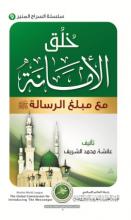The Prophet of Mercy Website
Muslim World League - Global Commission for Introducing the Messenger
In Islam, faith and good works go hand-in-hand. A mere verbal declaration of faith is not enough, for belief in Allah makes obedience to Him a duty. Only when your practice is consistent with your profession will you be a true Muslim. Faith in Allah will be your strength, and the Qur'an your guide.
The Muslim concept of worship is very broad. Muslims consider everything they do in this life according to Allah's will, an act of worship. Speaking the truth, refraining from gossip, dealing honestly in commercial affairs, treating one's parents with respect and honor, helping the poor and needy, dealing lovingly and fairly with family members - whatever is done for the sake of Allah is called worship.
Worship of Allah is foremost in a Muslim's mind all the time. There are also five formal acts of worship which help strengthen a Muslim's faith and obedience. They are often called the "Five Pillars of Islam."
Testimony of Faith (Kalima)
This is simply the declaration, "I bear witness that there is no deity but Allah, and I bear witness that Muhammad is His servant and messenger." As mentioned previously, all of Islam is based on faith in the Unity of God. When one declares this statement, one testifies to the Unity of Allah, and to the message of the Prophethood. When one bears witness that Muhammad is His messenger, one is confirming that all of the prophets before him were also His messengers - Allah is One and His message is one. A person becomes a Muslim when he or she declares this statement with purity of heart and conviction of faith.
Prayer (Salat)
Formal prayer is the most important act of worship; it is mankind's connection to Allah through which one gathers strength, guidance and peace of mind. Islam prescribes five formal prayers daily, through which Muslims repeat and refresh their beliefs, taking time out of their busy day to remember Allah and renew the effort to follow His guidance. Five times each day (before dawn, noon, afternoon, after sunset, and evening) Muslims rise, cleanse with water, and present themselves directly before Allah for prayer.
Far from being a ritualistic and mindless activity, prayer constantly reminds us of the purpose of life itself, refreshes our faith, and keeps our belief in Allah alive and ever-present. We go back to our wordly affairs conscious of our duties and strengthened against sin. Prayers said in congregation bond Muslims together in love and brotherhood. Prayer also symbolizes the equality of believers; there is no hierarchy, and all stand side-by-side in rows and bow only to Allah.
Aside from the five formal prayers each day, Muslims begin and complete every activity with Allah ever-present in their minds. The words "Bismillah" (In the name of Allah) precede every action, and "Alhamdilillah" (Thanks be to Allah) completes it. Muslims also make private supplications, and words in praise of Allah fall constantly off one's lips.
Fasting (Sawm)
"O you who believe! Fasting is prescribed for you, as it was prescribed for those before you, that you may learn self-restraint. Fast for a fixed number of days....Ramadan is the month in which was sent down the Qur'an, as a guide to mankind, and clear signs for guidance and judgment between right and wrong. So every one of you who is present at home during that month should spend it in fasting....Allah intends every facility for you; He does not want to put you to difficulties. He wants you to complete the prescribed period, and to glorify Him in that He has guided you; and perchance you shall be grateful" (Qur'an 2:183-185).
What the prayers seek to do five times a day, fasting in the month of Ramadan (9th month of the lunar year) does once a year. During this month, Muslims do not eat anything nor drink even a drop of water during the daylight hours. Each and every moment during the fast, we suppress our desires and remember Allah alone. This places in us a consciousness of duty and a spirit of patience that helps strengthen faith in Allah. Discipline and hardship during this month bring us face to face with the realities of life and the suffering of so many throughout the year. The whole month is filled with increased devotion, piety, and purity of mind, soul and body.
Almsgiving (Zakat)
Every Muslim whose financial conditions are above a certain specified minimum, must pay annually at least 2.5% of his savings to a deserving needy person, a new convert to Islam, a traveler, or one overwhelmed by debts. This fosters in a Muslim the quality of sacrifice and rids one of selfishness, greed and vanity. As all wealth is a gift from Allah, one has the duty to help his needy brethren when he is able.
Pilgrimage (Hajj)
Once in a lifetime, a Muslim who is financially and physically able must go on the pilgrimage to Mecca, Saudi Arabia, during the month of Hajj (12th month of the lunar year). Mecca is the spiritual center of the Muslim world. It was here that Abraham built the first house of worship (the Kaaba), towards which all Muslims stand in unity in their daily prayers. "The first House of worship appointed for men was that at Bakka (Mecca), full of blessing and of guidance for all the worlds. It it are Signs manifest - the Station of Abraham - whoever enters it attains security. Pilgrimage thereto is a duty men owe to Allah, for those who can afford the journey..." (Qur'an 3:96-97). When this house was desecrated into a center of pagan worship, it was the prophet Muhammad that cleansed it of its 300+ idols and rededicated it to the worship of Allah alone.
All pilgrims dress in pure white cloth, and are required to suppress passion, refrain from any bloodshed, and be pure in word and deed. "For Hajj are the months well-known. If any one undertakes the journey therein, let there be no obscenity, nor wickedness, nor wrangling in the Hajj. And whatever good you do, be sure Allah knows it. And take a provision with you for the journey, but the best of provisions is right conduct..." (Qur'an 2:197).
The pilgrimage is a great international conference, wherein all people, kings or peasants, black or white, stand before Allah as equals. During the ten days of the annual pilgrimage, several million Muslims from all over the world, of all nations, languages, and colors come together in the largest spiritual gathering of the world.
http://www.imanway.com/site/en
******






